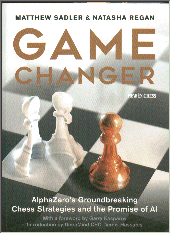
I’m not a good chess player, infact on my recent 68th birthday
they arranged the candles on my cake in the shape of an ‘?’
This is me when computers and chess crop up.

I’ve not changed. But AlphaZero is completely different. A new breed.
I had heard all the hype but ignored it and not matter how many links
people were giving me to games Alpha played there was no way I was
going to play over a computer v computer game. (did that once, they had
to get the Good Samaritans to talk me down from the edge of a cliff.)
One lad even offered to buy me a copy. (an offer I nearly took him up on it
- not to read but to sell on E-Bay.) I even started arguing with people about
the book even though I had never seen it let alone owned a copy or read it.
Eventually I played over one game. ‘Wow!’ and bought the book.
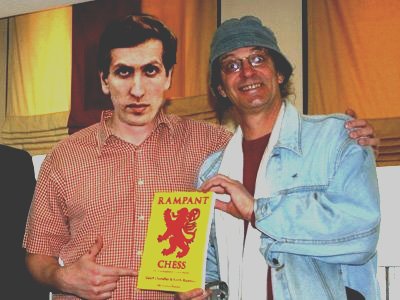
OOPS! wrong book. that is one I wrote with Keith Ruxton.
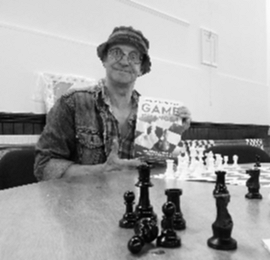
That is a pretty naff picture. I did it in B&W trying to get in touch
with my highbrow how slick am I side. I’ll use another. How’s this.
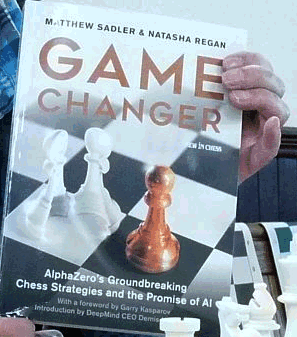
I really should not be reviewing this book, I keep looking over my shoulder.
The last two pieces of advice my dad shouted at me as his home made
canoe disappeared over Devil Fork rapids have stayed with me all my life.
‘Never kiss a woman with chapped lips and don’t do a review of a book if
you think you will be out of your depth and others are raving on about it.
I have caught chapped lips and I’m out of my depth. (though not as bad as
dear old dad going over Devil Fork rapids in his home made canoe) and
as early as February everyone tipped it as the ‘2019 Chess Book of the Year .’
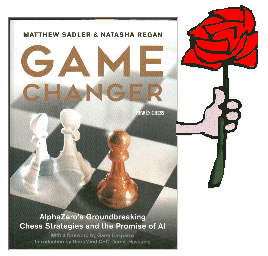
It’s not the chess that is causing the problem, I’m good at tactics and as
chess is 99% tactics (Teichmann 1868-1925 ) then I can always wing it.
It’s the technical stuff inside the book. I was finding difficult to evaluate.
When I watch my re-runs of ‘Sgt Bilko’ I do not sit there wondering how do they
get the picture from a small silver disc onto my T.V. Screen. I just enjoy the show.
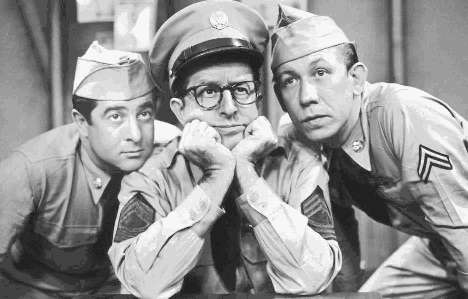
So when a computer is programmed with nothing else but the rules of chess,
told to get on with it and produces some scintillating and rousing games I was
impressed with what it did, rather than how it did it. If I tried to explain this.
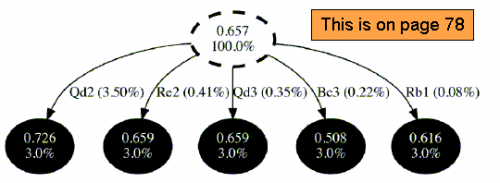
It would really be like this,
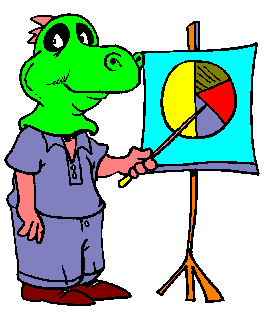
Then along came page 73. Cannot believe I missed it first time around. They write:
“Alpha is unconstrained by human designs or lack of imagination and has complete
flexibility in choosing the features it takes into account when evaluating a position.
But how Alpha’s value network works remains a bit of a mystery and cannot be explained.’
If the people who designed and programmed it have no idea what is going then how
on earth am I going to explain it. And that was the solution to my minor dilemma .
But I have jumped ahead of myself let us start at the very beginning.

Demis Hassabis was playing in a chess tournament. He saw all these heads bowed
in deep concentration and thought to himself was a waste of human brain power.
So he quit chess and set up an artificial intelligence company which became Deep Mind.
From this came the chess playing program called AlphaZero (I’ll refer to it as Alpha.).
First Alpha was taught the rules of chess and nothing else.
Then for 9 hours it played 44 million games against itself.
(do not do any ‘going blind for playing with itself jokes...Ed.).
It played Stockfish, apparently one of the very good computers and over the
course of 220 games it won 62 games compared with 11 wins by Stockfish.

I’m a bit like Demis Hassabis. he was in despair about the waste of human
brain power. I was frustrated at the sheer waste of a powerful computer’s
potential striving for perfect chess when human v human games are far from
perfect and played in a domain where the two move trick and blunders rule.
What would happen if you got one not to expect the best move in reply.
What if you got one that did not always play what it considered the best
move but another move a 2nd choice move that has more chance of winning.
In the old days (if you read this in 2025 ‘old days’ will make sense.) computers
use to look for and expect in reply what it considered was the very best move.
It told the user what was happening by use of an evaluation number. e.g. ‘3.69’
Sometimes I would innocently ask what does ‘3.69’ mean, I’d get a snappy reply.
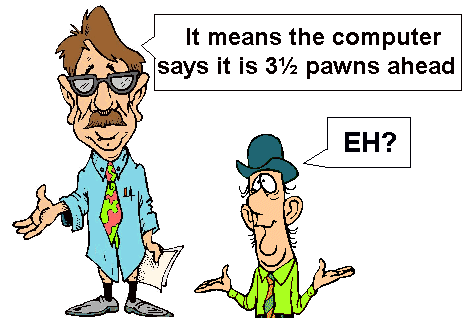
You would look at the position in question and see that White is
crawling all over Black, winning easily but it is actually a pawn
down. You just happen to mention this and are told to ‘shut up!’.
I’m talking about this kind of thing from a 1400 human v 1400 human game.
tower888 - beastial pride RHP 2008 (White to play)
White is a piece down the computer (every one I’ve tested) always plays Qf3.
just a few evaluation points later (from say 3.69 to 3.65) comes the move Qh3.
In the human game White played 7.Qh3 Black took the Rook and was mated with 8.Qc8.
You can come across thousands of examples of this and to be fair, thousands
of examples of a human missing a deep mate that only a computer can find.
But because of it’s strict limitation of only playing the best move, in the above
example a computer would have lost a game from a position a 1400 player won.
I’m willing to compromise. Give us a button so we can knock these things into
‘Cheapo Mode’ so it’s off the leash and show us some of the fantastic variations
it can obviously see but cannot show because it’s been........politically corrected!
I’m sure these top dog computers are as frustrated as me at not being able to display
it’s full potential. These things can set traps 25 moves deep that every human from
Adam to Carlsen would fall into thinking they are winning. Make it so. Let it happen.
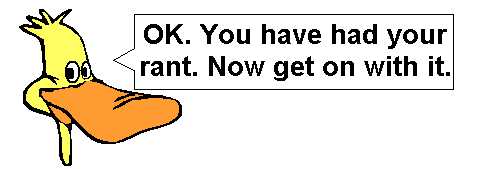
Alpha uses the percentage method. It selects a move from a group a promising
cluster of moves and seems to (nobody really knows ) select a move based on
the percentage of it winning. The move chosen seems to be, if the position allows
it, looking for a plausible reply that gives it the highest percentage of a win.
In the above example based on what I’ve seen (and you are about to) I reckon
Alpha would have played Qh3. based on the few choices and the chance of a win.
Best explained with a game (infact it was this game that latched me on Alpha)
Alpha (too play) v Stockfish. (page 202 in the book)
Alpha played 27 Re4 offering the d-pawn. Stockfish refused it and played 27...Rb8
Alpha then played 28.Re2 Ra8 and we are basically back were we started.
If 27 Re4 was the ‘best’ move why is it not here. Alpha played 28.Bc1.
Other computers looking for moves where they evaluate a position with a number
can never play anything that is lower than their evaluation number. They just can’t.
If 37.Re4 was their best move that would go back and play it again and again.
Alpha with it’s percentage method of ‘thinking’ is more flexible, more human
and what you have just seen is a computer setting a trap. Here is what happens
if Stockfish had taken the d-pawn. Mathew does not give this variation, I worked
it out for myself. Joy of Joys when I saw a few days later another lad had the same line.
Of course Mathew is a Grandmaster and never resorts to using the word ‘trap’ but to
me (my review..my opinion.) that is what we just saw. 3 days later I bought the book.
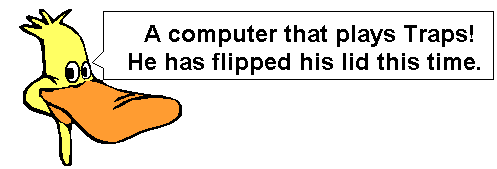
‘How does Alpha Play?’
page 98 has 14 bulleted points, most of which you will find in any chess primer but we
are taking about a strong computer here....a self-taught strong computer, it’s comforting
to know we humans got some things right. The following stand out as not being the norm.

Not theoretical sacrifices, it’s own! If we let Alpha loose on the gambits then there
is an excellent chance that some old bust lines will be..er...unbust...and visa-versa.

It is re-writing the importance of Knights in chess. Of course it likes Bishops,
and can adapt to playing with either, but it’s Knight play is very impressive.

That is what humans do, how does a computer know what confusing is but that is
what it ‘seems’ to be doing. You need to buy the book and form you own conclusions.

This is something known to us. Not blindly seizing an open file when there is,
as yet, an unopened file which may become more important is a trick of the trade.
Alpha moves this up a notch and brings a new meaning to ‘mysterious Rook moves.’
Mathew goes into great detail about this on pages 48 - 50 and pages 156 - 161
when measuring Alpha’s expected percentage of a win (a plus ) v Stockfish
saying the position is equal, and thinks that Stockfish may give too much credit
to it being the owner of the only open file. Something for the S.F. team to look at?

‘Chapter 4: ‘How Alpha Thinks’ (my take on it in layman’s terms)
Alpha, which remember was self taught, after playing 44 million games discovered
that the King is the only piece that MUST by the rules of the game get out of being
attacked (check - anything else is illegal.) checkmating the King is the prime objective
Alpha has sussed out that the King is the principal liability and MUST follow three rules
if attacked. 1) Move the King. 2) Block the check. 3) Take the piece that is giving check.
No other piece is bound by these rules. You can attack any other
piece and if your opponent chooses to ignore it, then so be it.
And since a Knight check cannot be blocked which cuts the options
to two now we know why (a guess) Alpha has a huge respect for Knights.
Pretty radical eh? The object of the game is checkmating the King. (we sometimes forget that.)
It is not disproving the principles set down by 250 years of chess theory but it is
casting aside what are considered important assumptions and taking chess back
to it’s grass roots. Attack the King, get at the one piece that is a legal hindrance
to your opponent, Only this time it’s done in a much refined and disguised manor
than Alekhine or Kasparov could ever do. Mathew calls it a ‘slow burning attack.’
This is a position from a game Mathew talks about, the notes are mine.
Stockfish - Alpha
White appears to have everything we are told to get and be very happy with.
A genuine Knight out post, in full command of the e-file, a nice tidy grip on
the centre. Black has loose pieces (the Rook and Knight pawns c6 and a5).
Alpha’s compensation is the tactical threats hanging over the White King
47.Qe6 ....
Attacking the c6 pawn and the Knight. It's what you do when you have all the mobility.
47 .... Nh4
If 48.Qxc6 then 48...Nxg2 and Black is now winning. The White Queen meekly returned
to e2 and Black crept forward. The White pieces can never stray too far from the King.
The e-file which White took on move 12 and kept till move 96 did nothing of any value.
Alpha loves throwing it’s h-pawn at up the file to oppress the enemy King’s position.
Then it seems to forget about the King and plays ‘normal chess’ all the while looking
to see if it can get in that killer check whereas the modern player seems to go first
for position in Steinitz fashion and then and only then think about the enemy King.
Alpha seems to think any King weakness no matter how obscure is enough to
outweigh all other positional considerations. Get that in first and then start
to gather other positional points using the weakened King as a distant target
as it slowly creeps forward, nicking a square here and there till many moves
later Stockfish finds itself in a 20 move deep zugzwang and blows a fuse.
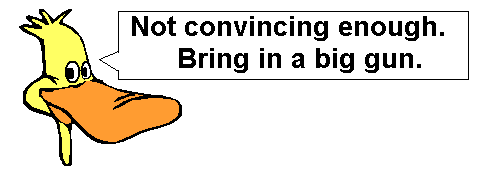
Kasparov wrote the introduction to the book and writes:
“AlphaZero’s strength is impressive, but its method is far more important.
AlphaZero isn’t just applying human knowledge and ploughing through billions of
positions to generate moves - it’s creating it’s own knowledge first. And, based on it’s
results and my observations, the knowledge it generates for itself is unique and superior. “
And you cannot argue with me (or Kasparov) on this. Remember this bit:
“Alpha’s value network works remains a bit of a mystery and cannot be explained.”
If they don’t know then who does? My stab in the dark is just as good as anybody’s.

Mathew writes in glowing terms of Alpha play throughout the book spotting many things
that impressed him. BTW here is how he looked at the first batch of games Alpha played.
"I like to play through games with the fast-forward button held down, which means that a
full games flashes before my eyes in about 10 - 15 seconds. It's enough to get a feel of
the outline of the game and a sense of whether something unusual happened." (page 33)
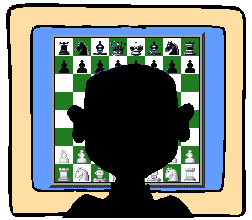
I would not try that at home. Indeed page 17 ‘How to read this book’ advises that
you play through the games with a chessboard ‘...as it promotes a measured pace of
reading most conductive to learning.’ I strongly agree and that goes for any chess book.
Mathew notes are excellent and spots most of the shots that space allowed.
The book has 400+ pages and some of the games are really quite superb and
there is nice mixture of human v human games showing Alpha comparisons.
Even the games not in the book are good. I’ve been playing over a load of them.
Stockfish - AlphaZero, Match London, 2018 ‘The Mirror Trap’
(This also contains a bad blunder from Alpha. It looks like one my traps)

Now let’s get the ‘Grunts, Groans and Nitpicks out of the way.’
No opening index. It’s a serious pain having all these games in the book and no easy
way of getting to them other than flicking through the book again and again and again.
They have given some of the games names. (apparently inspired by Fischer naming his
games in 60 memorable games. - I always thought the game names came from Evans.).
But there other games by humans. Carlsen, Botvinnik, Blackburne, Keres, Chigorin,
Anand, Tal. None of Fischer. (they nick his idea but do not give one of his games.)
In the end a mate of mine listed all the games in the book here with pages numbers.
I made a condensed print out and glued it in the back of the book. When you buy the
book you will need to do this, or something like it and beware some of the same games
have different names which adds greatly to the confusion when hunting for a game.
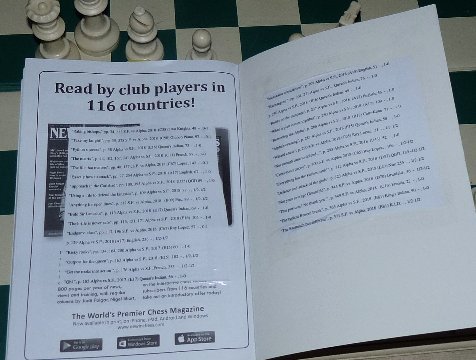
And...I was going to let Edward Winter get this but changed my mind.
There are 14 people listed in the Index of Names that are meant to appear
on page 12. None of them do. A below the belt nit-pick but it is an error.
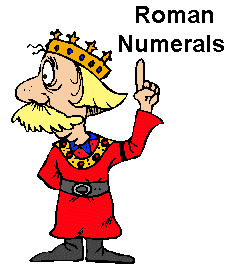
There are Roman Numerals in the Techno part of the book
Why do they do that. I know them up VIII thanks to King Henry the 8th. After
that it’s a few seconds (6,000 Alpha self-played games) to figure out the number.
I wonder which one of them decided to let the Roman Numerals stay in.
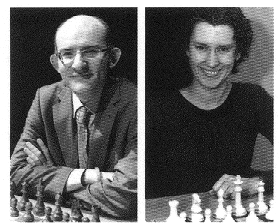
Mathew Sadler, Natasha Regan. It will be Natasha, she looks like a school teacher.
Inspired by computer play. remember this....

Well I’m still the same regarding all non-Alpha garbage but soon after playing
through a handful of games from the book. I thought I’d better pay homage.
greenpawn - Alex Robinson RHP 2019
Not too good, let's try again.
Green Pawn v Black Rook RHP 2019
Finally (phew) Just buy it. You will enjoy the games and Mathew notes.
You may also understand the technical section (about 150 pages of it)
The thread accompanying this blog is Thread 181879

